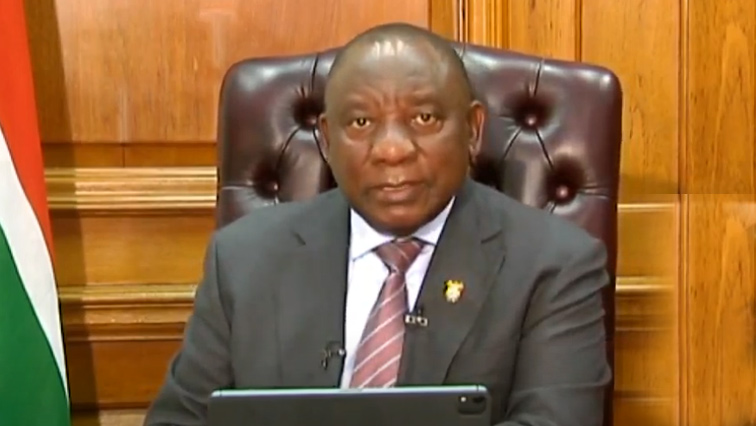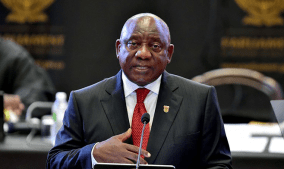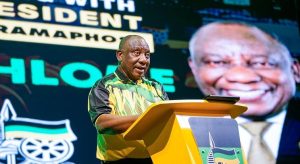President Cyril Ramaphosa says South Africa will remain on Alert Level-3 coronavirus lockdown. This as the country continues to see an increase in the number of coronavirus cases.
The President was addressing the nation on Monday night, during what is now called ‘family meeting’, following an urgent meeting with the National Coronavirus Command Council (NCCC), cabinet, and other stakeholders.
He says public gatherings are being prohibited across the country, except for the funerals, which also must be attended by not more than 50 people. Ramaphosa says this is done to make sure that less people are infected with the coronavirus.
“Cabinet has decided to maintain the country at the Adjusted Level 3. Most of the measures that were announced in December 2020 will remain in place. Given the risk of rapid transmission, most indoor and outdoor gatherings are prohibited. This includes social gatherings, religious gatherings and political events traditional council meetings and gatherings at sports grounds.”
The President says the restrictions on religious and other gatherings have to remain.
“Research has identified several risks that arise from religious services and other gatherings. These include the risks associated with enclosed spaces, large groups, close proximity to others, staying for a long time in one place, and loud talking and singing.”
Ports of entry
“To reduce congestion and the high risk of transmission, Cabinet has decided that the 20 land ports of entry that are currently open will be closed until the 15th of February for general entry and departure,” President announces on Monday.
These include the six busiest border posts, which are Beitbridge, Lebombo, Maseru Bridge, Oshoek, Ficksburg and Kopfontein. People will be however still be allowed to enter or depart the country for:
– the transportation of fuel, cargo and goods,
– emergency medical attention for a life-threatening condition,
– the return of South African nationals, permanent residents or persons with other valid visas,
– diplomats,
– the departure of foreign nationals,
– daily commuters from neighbouring countries who attend school in South Africa.
Schools reopening
Concerns have been raised about whether it will be safe for children to go back to school under the dark cloud of the pandemic. “The NCCC is dealing with this issue and will provide guidance on this matter in the coming days. As the country returns to work after the festive break, it is essential that all places of work ensure that they continue to have safety protocols in place & that these are adhered to.”
The number of new infections, hospital admissions, and deaths is higher now than it has ever been since the first case was recorded in the country in March last year.
President Cyril Ramaphosa addresses the nation:
Increase in cases
Since New Year’s Day, South Africa has recorded nearly 190 000 new coronavirus infections. “The country has recorded more than 4 600 COVID-19 deaths so far this year. Since the start of the pandemic, we’ve recorded a cumulative number of more than a 1.2million COVID-19 cases. We’ve recorded more than 33 000 deaths & more than 148 000 people have been admitted to hospital.”
In the last seven days, KwaZulu-Natal has had the highest average number of cases, followed by the Western Cape, Gauteng, Limpopo, and Mpumalanga.”
“New infections in KZN and the Western Cape have grown fast and have now far exceeded the peak during the first wave. Infections in Gauteng are growing exponentially & are expected to increase further as more residents of Gauteng return to the province following the festive break.”
The increase in the number of cases has been attributed to the new variant known as 501.v2. The variant was first identified in South Africa in November.
“We do know that this new variant of the virus spreads much faster than the earlier variants. This explains the fact that many more people have become infected in a far shorter space of time.” President Ramaphosa says the variant is putting pressure on the health system. “ There are currently over 15 000 people with COVID-19 in hospitals nationally, placing a considerable strain on health facilities, personnel, and equipment. Around a third of all COVID-19 patients in hospitals are on oxygen.”
An explanation of what the new variant is:
20 million doses of vaccines
President Ramaphosa says South Africa has secured 20 million doses of COVID-19 vaccines which are expected to be delivered mainly in the first half of the year.
“We will make further announcements as we conclude our negotiations with vaccine manufacturers.”
He has urged South Africans to adhere to the safety regulations in order to reduce the transmission of the virus, adding that the government will also be embarking on a massive programme of vaccination in order to achieve immunity across the population.
“When enough people are vaccinated, we will reach what is known as ‘herd immunity’ or ‘population immunity’. This is when enough of the population is immune to the virus to provide indirect protection to those who aren’t immune, bringing the spread of the virus under control. “
The government’s vaccination strategy will reach all parts of the country. “It will be far more extensive than our HIV treatment programme or even our national, provincial and local elections in terms of the number of people who have to be reached within a short space of time.”
We will also prioritise people in institutions like old age homes, shelters and prisons, people over 60 years of age and adults with co-morbidities. The total number we plan to reach in this phase is around 16 million people.
— Cyril Ramaphosa 🇿🇦 (@CyrilRamaphosa) January 11, 2021






